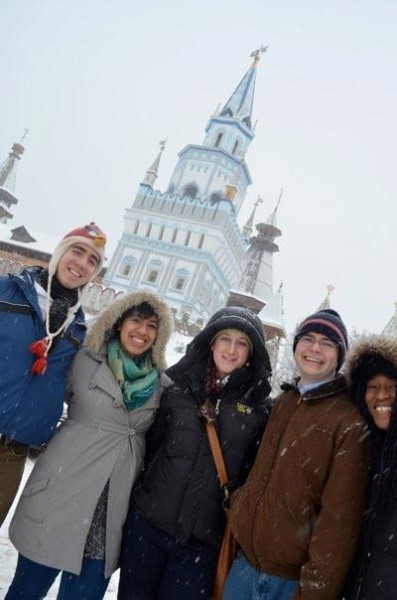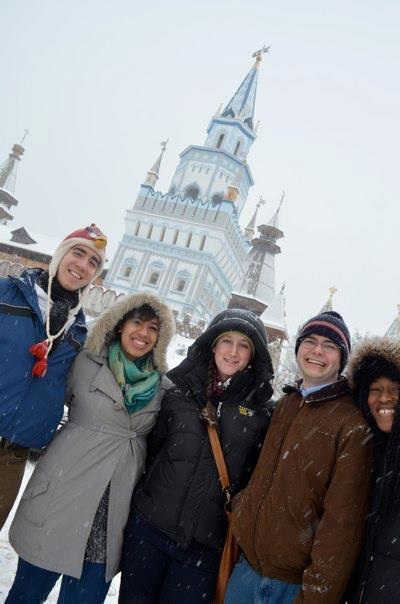The Bing Overseas Studies Program (BOSP) in Moscow is moving its study-abroad program from fall quarter to spring for the 2014-15 academic year, due to rising demands from students who wanted to stay in Russia longer than the 10-week term.

Though the first year will be an experiment, BOSP expects the change to be permanent. The new schedule will give participants the option of extending their stay into the summer, an increasingly popular option for students looking to pursue internships abroad.
Besides the specialized program in Australia, the Moscow center is the last of BOSP’s 11 quarter-long programs around the world that currently does not offer a spring quarter option.
“We found — not just in Moscow, but in other places around the world — [one quarter] is just too limited a time,” said Ramón Saldívar, director of BOSP. He added that winter break is not enough time for students in Russia to continue their studies and immersion.
Though BOSP in recent years has pushed for more internship opportunities for its students in Moscow, the quarter shift signals the program’s move towards formally incorporating more forms of “experiential and community-engaged learning” at its only eastern European site. Several other BOSP centers already offer formal internships and other immersion programs.
Saldívar said that it will take a few years before the Moscow program starts receiving the same support that more established programs, like Kyoto and Berlin, receive. In those locations, students are eligible for prearranged internships, many of which are paid for through funding from endowments and alumni support.
While Moscow has a designated staff member to manage internships, past participants said limited networking connections sometimes left students to make their own arrangements.
Alexandra Cox ‘14, who studied in Moscow during the fall of her junior year, became aware of this shortcoming at the Moscow site when an anticipated internship fell through.
“I wish I had pushed more before starting the program, because my understanding going into it was that [BOSP’s Moscow office] would set up the internship for you,” she said. “But I guess they didn’t.”
For Kyle Dumovic ‘14, who was in Moscow for the same quarter as Cox, 10 weeks was sufficient time to find and hold short-term internships at two tech companies. However, he said that the quarter change from fall to spring is more ideal for longer-term internships.
In the past, students have worked around the inconvenient timing by either returning to Moscow after completing the winter and spring quarters at the main California campus, or not returning until much later. Some students, like Kevin Rouff ‘15, take a leave of absence to participate in other non-Stanford programs in Russia.
In Dumovic’s case, after returning to Palo Alto for the remainder of the academic year, he traveled back to Russia with a grant to study foreign languages.
“If I had applied for that [grant] while I was abroad there in the spring, then I wouldn’t have even had to go home,” he explained. “I could have just bought a plane ticket to where I was studying.”
Even for students who aren’t concerned about summer internships, studying in the spring puts them in prime position to travel around Russia and Europe in the summer, another appealing alternative.
Miguel Boluda ‘14 was a sophomore when he studied in Moscow in 2011. Though he said he would have seriously considered it, he added that he didn’t know if he would have been ready at the time to remain abroad for the summer.
Yet, one quarter in Moscow shaped the rest of his undergraduate career.
“I knew I needed to go abroad early because I knew it would be an impactful presence in my life,” Boluda said. He ultimately switched from a major in communication to international relations.
He believes studying abroad earlier could benefit more students. Currently it’s rare for students to study abroad in the fall of their sophomore year since they have to decide to apply as freshmen. But under the new schedule for Moscow, sophomores would have more time to consider studying abroad before applications close.
Currently, the Moscow program rarely reaches its 25-student capacity. On average, 18 students go, said Saldívar. In 2012, only 10 students went to Moscow, while more widely subscribed programs, like those in Australia and Oxford, easily filled their 40-student capacities.
“The bigger the program, the more resources we have, and the more things we can do for the students there,” Dumovic said.
The schedule change does impact current juniors who are thinking of studying in Moscow in the fall of their senior year. Spending spring quarter of senior year abroad is difficult and highly discouraged by BOSP.
BOSP student advisors, including Dumovic and Boluda, are helping students affected by the change to find other routes to studying abroad.
Contact Vanessa Ochavillo at vochavillo ‘at’ stanford.edu.
